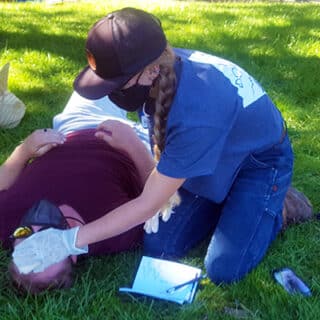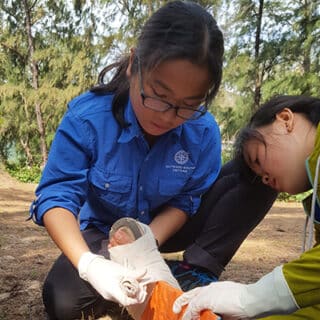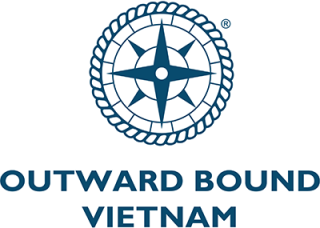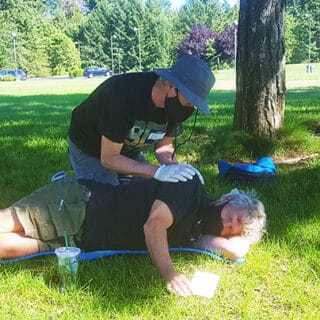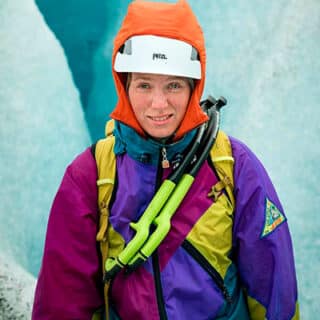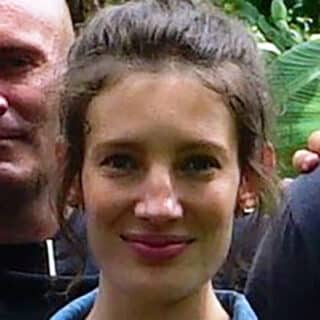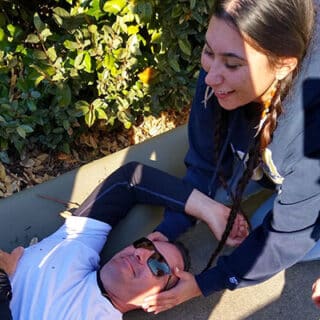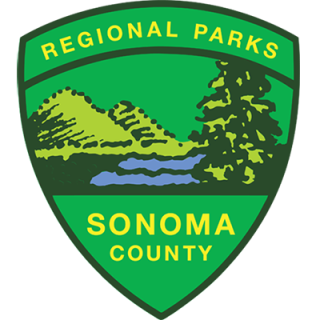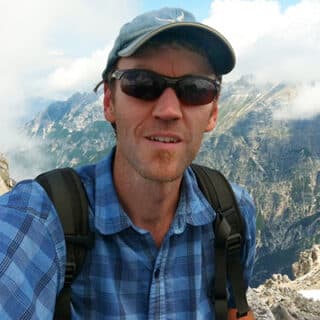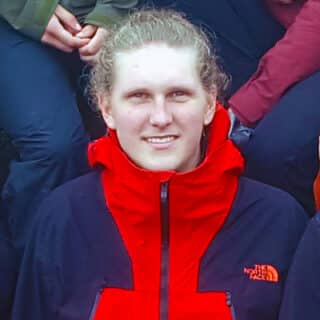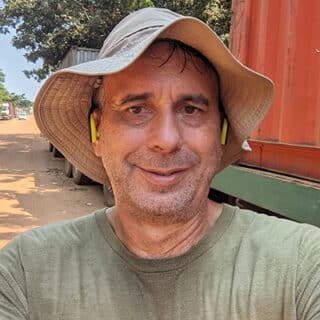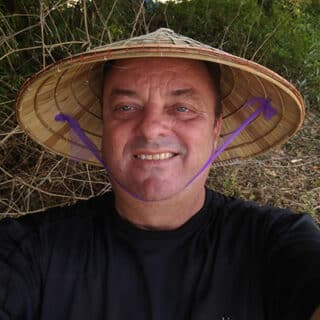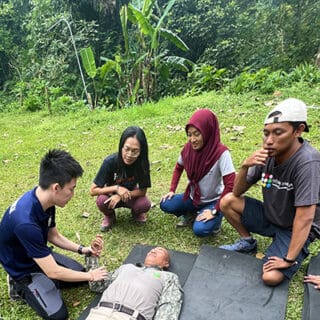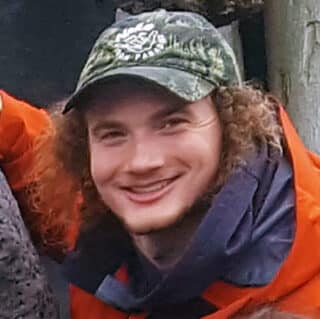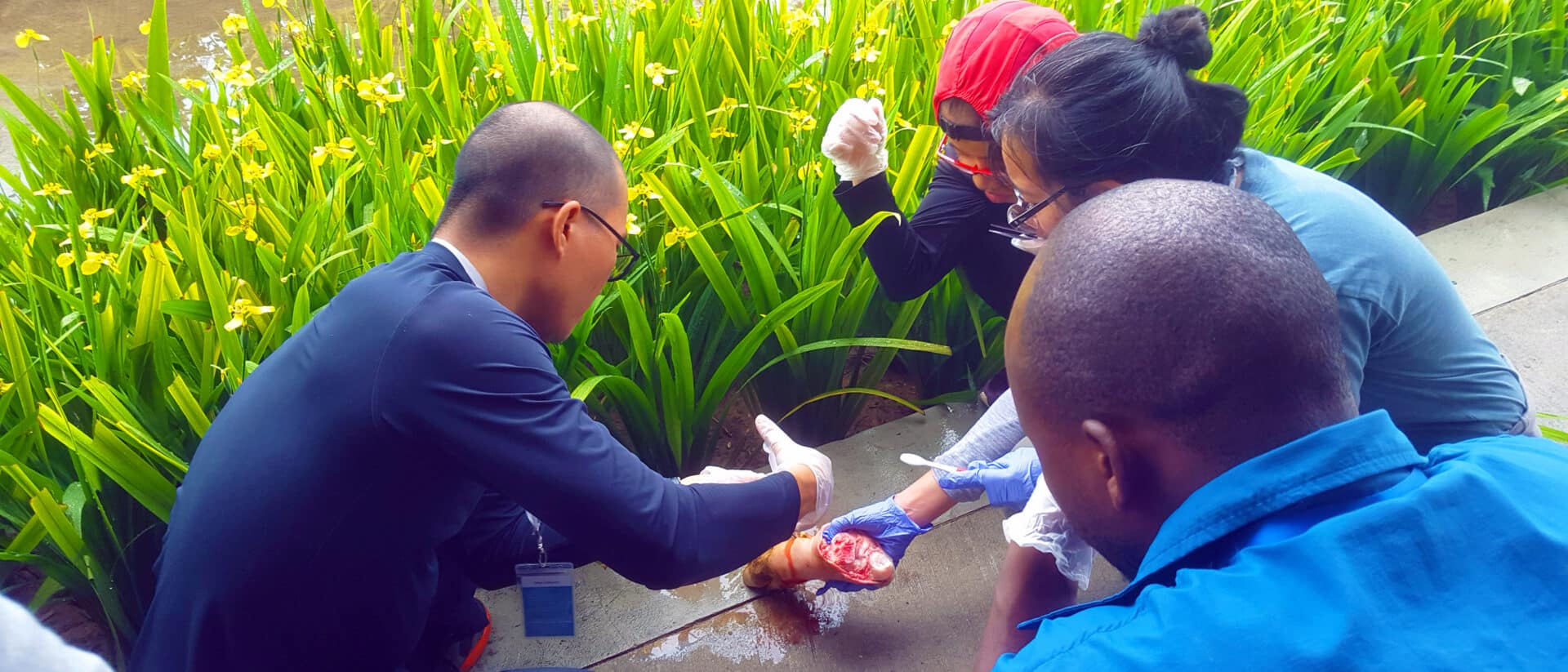
Wilderness EMS Upgrade
Wilderness medicine training for EMS providers
Add essential knowledge and skills for assessing, treating and transporting patients in remote, austere, disaster, humanitarian aid and backcountry settings. Prior EMS certification required.
Training includes expanded scope of practice protocols as well as incident command and complex situation management skills in extreme environments.
Course Overview
Wilderness EMS Upgrade
Course # wm-ems-231101
Dates
November 13 –
November 29
Course Length
5 days
Location
Ho Chi Minh City, Vietnam
Registration deadline
November 12
Cost
USD 899
Language
English
Certification
Wilderness EMS
Course Description
The Wilderness EMS upgrade course includes content from our standard Wilderness First Responder curriculum as well as advanced concepts and practices.
- General Principles of Rescue and Wilderness medicine, including prevention, assessment, extended-care treatment, and evacuation.
- Basic Life Support and Advanced Life Support, including CPR and appropriate medical technology such as medication and fluid administration, airway and ventilation management, and injections.
- Environmental medicine, including thermoregulation (hypothermia/hyperthermia), cold injury including frostbite, lightning strike injury, drowning, and backcountry toxins.
- Assessment and treatment of common medical problems, such as those involving eyes, ears, nose, throat and gastrointestinal/genitourinary systems.
- Musculoskeletal problems including fractures, sprains, strains, overuse injury, and reduction of certain dislocations.
- Management of wounds including burns, blisters, lacerations, and internal bleeding, including long-term assessment and management.
- Practical skills including extremities splinting; patient carries; wound dressing and bandaging; litter/stretcher carries, vacuum mattress use, and lifting, moving and extrication (LME).
- Expanded scope of practice protocols including wound management (such as wound cleaning, infection management, impaled object removal, and tourniquet use), reduction of simple dislocations, neurological evaluation of spine injuries, cessation of CPR, and treatment of asthma and anaphylaxis including use of injectable and Rx medications.
- Crew resource management, Just Culture (safety culture) and human factors in rescue and team response
- Emergency telecommunications by radio, phone, satellite-based communicators, and otherwise
- Incident Command System (ICS) in interagency response, SAR, and disaster management
Certifications
Upon successful course completion, learners will receive a Wilderness EMS Upgrade certification, valid for three years from the date of course completion.
Current EMS or other professional medical certification is required for WEMS certification validity.
Evaluation
Evaluation is based on assessment of psychomotor skills during simulations, drills, and labs, as well as on results from the written exam. The course is pass-fail.
Full participation in all pre-course online activities and in-person lectures and practical sessions is required.
Viristar will make reasonable accommodation for learners with special needs.
Recertification
Wilderness EMS Upgrade graduates may recertify by taking the course again, or by taking a Wilderness First Responder Recertification. In the latter case, pre-course work specific to the WEMS curriculum must be completed.
Prerequisites
Prospective learners must have a current EMS certification or other professional medical certification in order to be accepted onto the course.
Participants must have high-speed internet access and a device to access and complete online pre-course activities.
Continuing Education Hours
- EMT: 45
- Paramedic or Advanced EMT: 45
- Approved by Commission on Accreditation for Pre-Hospital Continuing Education (CAPCE)
- WEMS Upgrade courses are approved for 45 contact hours by the California Board of Registered Nursing (Provider #CEP17692).
Materials Provided
All teaching materials will be at no additional cost. Participants will receive the following books on this course:
- Wilderness and Rescue Medicine: A Practical Guide for the Basic and Advanced Practitioner
- The Field Guide of Wilderness and Rescue Medicine
- WEMS/WALS Class Notes
- SOAP Notebook
Equipment
We ask our sponsors and course hosts to provide basic outdoor equipment and any specific gear relevant to their personnel when in remote and austere environments. Viristar will supply a specific equipment list to cover simulation and classroom needs.
Customization
As part of Viristar’s commitment to your medical rescue training, our instructors and management will inquire about your group’s needs and teach according to your group’s backgrounds, environments, and experience. Simulations and hands-on activities will be realistic and relevant. Relevant adult education is incorporated directly into our curriculum to maximize learning of medical theory and development of practical skills.
Syllabus
DOWNLOAD FULL SYLLABUSTopics
Day 1
10.5 hours
Logistics and Introduction
General Concepts
Patient Assessment System
Critical Body Systems Review
PAS/SOAP Practice
Spine Injury Assessment
Medical/Legal Issues
Day 2
9 hours
Test I/Review
Anaphylaxis and Asthma
ALS/BLS
Lifting, Moving, Extrication
Litter Packaging and Carries
Scenarios I
Day 3
8.5 hours
Test II/Review
Pain Management
Soft Tissue Injury
Wound Cleaning and Exploration
Musculoskeletal Injuries
Extremity Splinting
Dislocations
Scenarios II
Day 4
9 hours
Test III/Review
Environmental Medicine
Scenarios III/Simulation
Day 5
8 hours
Simulation Debrief
Expedition Medicine
Scenarios IV
Medical Kits and Medications
Test IV
Conclusion
Instructor
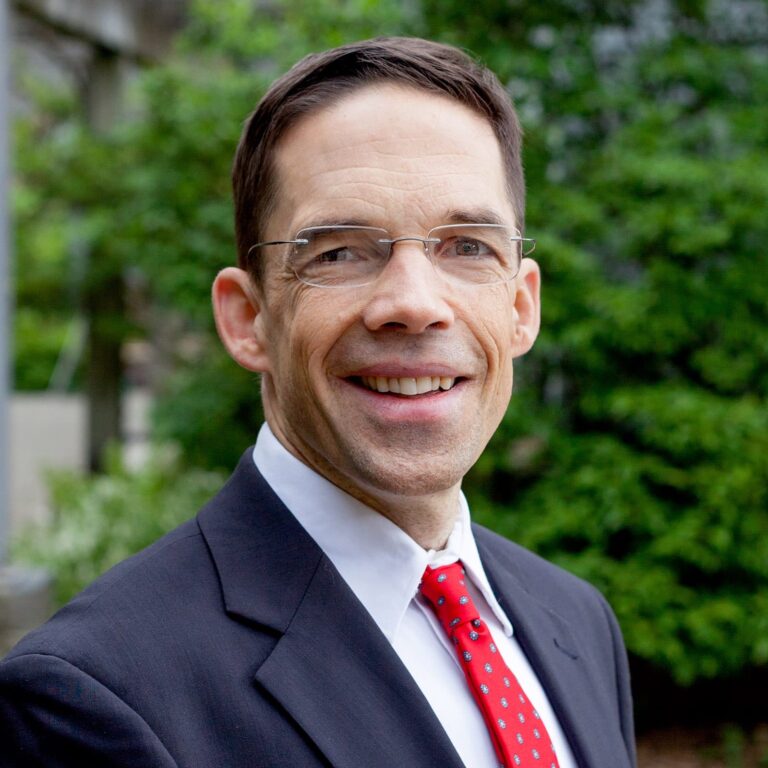
Jeff Baierlein
Jeff A. Baierlein (he/him) has been working professionally since 1987 with outdoor education, environmental education, adventure education and experiential education organizations in the USA and around the world. He led remote wilderness expeditions, worked as a naturalist-educator, served as an Emergency Medical Technician with ambulance services, led search and rescue missions, and was appointed to the Washington State Governor’s Council on Environmental Education.
Prior to founding Viristar, Jeff served as Executive Director of both the Boojum Institute for Experiential Education and the Baltimore Chesapeake Bay Outward Bound Center. His writing and lectures have been translated into Vietnamese, Russian, Marathi, and Chinese.
Course Description
The Wilderness EMS upgrade course includes content from our standard Wilderness First Responder curriculum as well as advanced concepts and practices.
- General Principles of Rescue and Wilderness medicine, including prevention, assessment, extended-care treatment, and evacuation.
- Basic Life Support and Advanced Life Support, including CPR and appropriate medical technology such as medication and fluid administration, airway and ventilation management, and injections.
- Environmental medicine, including thermoregulation (hypothermia/hyperthermia), cold injury including frostbite, lightning strike injury, drowning, and backcountry toxins.
- Assessment and treatment of common medical problems, such as those involving eyes, ears, nose, throat and gastrointestinal/genitourinary systems.
- Musculoskeletal problems including fractures, sprains, strains, overuse injury, and reduction of certain dislocations.
- Management of wounds including burns, blisters, lacerations, and internal bleeding, including long-term assessment and management.
- Practical skills including extremities splinting; patient carries; wound dressing and bandaging; litter/stretcher carries, vacuum mattress use, and lifting, moving and extrication (LME).
- Expanded scope of practice protocols including wound management (such as wound cleaning, infection management, impaled object removal, and tourniquet use), reduction of simple dislocations, neurological evaluation of spine injuries, cessation of CPR, and treatment of asthma and anaphylaxis including use of injectable and Rx medications.
- Crew resource management, Just Culture (safety culture) and human factors in rescue and team response
- Emergency telecommunications by radio, phone, satellite-based communicators, and otherwise
- Incident Command System (ICS) in interagency response, SAR, and disaster management
Certifications
Upon successful course completion, learners will receive a Wilderness EMS Upgrade certification, valid for three years from the date of course completion.
Current EMS or other professional medical certification is required for WEMS certification validity.
Evaluation
Evaluation is based on assessment of psychomotor skills during simulations, drills, and labs, as well as on results from the written exam. The course is pass-fail.
Full participation in all pre-course online activities and in-person lectures and practical sessions is required.
Viristar will make reasonable accommodation for learners with special needs.
Recertification
Wilderness EMS Upgrade graduates may recertify by taking the course again, or by taking a Wilderness First Responder Recertification. In the latter case, pre-course work specific to the WEMS curriculum must be completed.
Prerequisites
Prospective learners must have a current EMS certification or other professional medical certification in order to be accepted onto the course.
Participants must have high-speed internet access and a device to access and complete online pre-course activities.
Continuing Education Hours
- EMT: 45
- Paramedic or Advanced EMT: 45
- Approved by Commission on Accreditation for Pre-Hospital Continuing Education (CAPCE)
- WEMS Upgrade courses are approved for 45 contact hours by the California Board of Registered Nursing (Provider #CEP17692).
Materials Provided
All teaching materials will be at no additional cost. Participants will receive the following books on this course:
- Wilderness and Rescue Medicine: A Practical Guide for the Basic and Advanced Practitioner
- The Field Guide of Wilderness and Rescue Medicine
- WEMS/WALS Class Notes
- SOAP Notebook
Equipment
We ask our sponsors and course hosts to provide basic outdoor equipment and any specific gear relevant to their personnel when in remote and austere environments. Viristar will supply a specific equipment list to cover simulation and classroom needs.
Customization
As part of Viristar’s commitment to your medical rescue training, our instructors and management will inquire about your group’s needs and teach according to your group’s backgrounds, environments, and experience. Simulations and hands-on activities will be realistic and relevant. Relevant adult education is incorporated directly into our curriculum to maximize learning of medical theory and development of practical skills.
Syllabus
DOWNLOAD FULL SYLLABUSTopics
Day 1
10.5 hours
Logistics and Introduction
General Concepts
Patient Assessment System
Critical Body Systems Review
PAS/SOAP Practice
Spine Injury Assessment
Medical/Legal Issues
Day 2
9 hours
Test I/Review
Anaphylaxis and Asthma
ALS/BLS
Lifting, Moving, Extrication
Litter Packaging and Carries
Scenarios I
Day 3
8.5 hours
Test II/Review
Pain Management
Soft Tissue Injury
Wound Cleaning and Exploration
Musculoskeletal Injuries
Extremity Splinting
Dislocations
Scenarios II
Day 4
9 hours
Test III/Review
Environmental Medicine
Scenarios III/Simulation
Day 5
8 hours
Simulation Debrief
Expedition Medicine
Scenarios IV
Medical Kits and Medications
Test IV
Conclusion
Instructor

Jeff Baierlein
Jeff A. Baierlein (he/him) has been working professionally since 1987 with outdoor education, environmental education, adventure education and experiential education organizations in the USA and around the world. He led remote wilderness expeditions, worked as a naturalist-educator, served as an Emergency Medical Technician with ambulance services, led search and rescue missions, and was appointed to the Washington State Governor’s Council on Environmental Education.
Prior to founding Viristar, Jeff served as Executive Director of both the Boojum Institute for Experiential Education and the Baltimore Chesapeake Bay Outward Bound Center. His writing and lectures have been translated into Vietnamese, Russian, Marathi, and Chinese.


